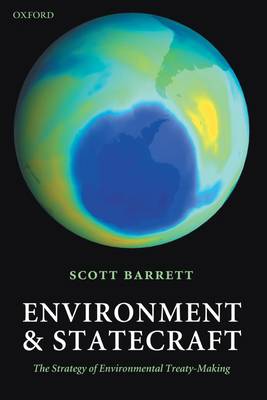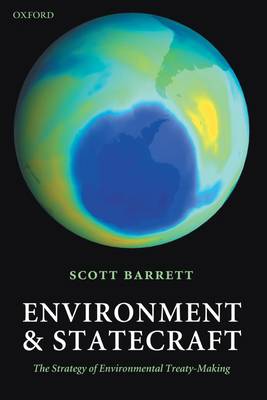
En raison d'une grêve chez bpost, votre commande pourrait être retardée. Vous avez besoin d’un livre rapidement ? Nos magasins vous accueillent à bras ouverts !
- Retrait gratuit dans votre magasin Club
- 7.000.000 titres dans notre catalogue
- Payer en toute sécurité
- Toujours un magasin près de chez vous
En raison de la grêve chez bpost, votre commande pourrait être retardée. Vous avez besoin d’un livre rapidement ? Nos magasins vous accueillent à bras ouverts !
- Retrait gratuit dans votre magasin Club
- 7.000.0000 titres dans notre catalogue
- Payer en toute sécurité
- Toujours un magasin près de chez vous
Environment and Statecraft
The Strategy of Environmental Treaty-Making
Scott Barrett
Livre broché | Anglais
42,95 €
+ 85 points
Format
Description
Environmental problems like global climate change and stratospheric ozone depletion can only be remedied if states cooperate with one another. But sovereign states usually care only about their own interests. So states must somehow restructure the incentives to make cooperation pay. This is what treaties are meant to do. A few treaties, such as the Montreal Protocol on Substances that Deplete the Ozone Layer, succeed. Most, however, fail to alter the state behavior appreciably. This book develops theory that explains both the successes and the failures. In particular, the book explains when treaties are needed, why some work better than others, and how treaty design can be improved. The best treaties strategically manipulate the incentives states have to exploit the environment, and the theory developed in this book shows how treaties can do this. The theory integrates a number of disciplines, including economics, political science, international law, negotiation analysis, and game theory. It also offers a coherent and consistent approach. The essential assumption is that treaties be self-enforcing that is, individually rational, collectively rational and fair. The book applies the theory to a number of environmental problems. It provides information on more than three-hundred treaties, and analyses a number of case studies in detail. These include depletion of the ozone layer, whaling, pollution of the Rhine, acid rain, over-fishing, pollution of the oceans, and global climate change. The essential lesson of the book is that treaties should not just tell countries what to do. Treaties must make it in the interests of countries to behave differently. That is, they must restructure the underlying game. Most importantly, they must create incentives for states to participate in a treaty and for parties to comply.
Spécifications
Parties prenantes
- Auteur(s) :
- Editeur:
Contenu
- Nombre de pages :
- 456
- Langue:
- Anglais
Caractéristiques
- EAN:
- 9780199286096
- Date de parution :
- 05-01-06
- Format:
- Livre broché
- Format numérique:
- Trade paperback (VS)
- Dimensions :
- 232 mm x 158 mm
- Poids :
- 666 g

Les avis
Nous publions uniquement les avis qui respectent les conditions requises. Consultez nos conditions pour les avis.






